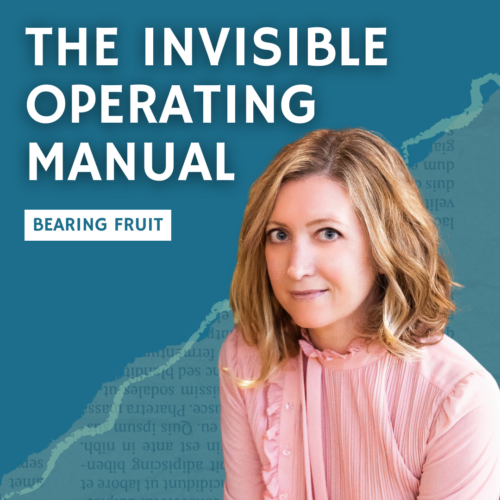The Invisible Operating Manual
The Protestant work ethic is so deeply ingrained in American culture that it’s hard to even know you’re operating according to its instructions. Like the fish who doesn’t know it’s in water. Swim with me and let’s identify the fluorescent-colored rocks that have been making up our belief systems about how we work.
I’m not necessarily saying any of these Protestant traits are bad. If you’re Protestant, do you. I believe it’s incredibly helpful to understand the indicators of the Protestant mindset that have influenced our collective psyche so you can decide for yourself if these notions are helping you or getting in your way.
Work should be hard.
This is the root of no pain, no gain. If it doesn’t hurt, you’re lazy.
Hard work is part of the same United States mentality that allows people to go unhoused and unsupported; the thinking is that they should have just worked harder.
I know you’ve got a big heart so you don’t think that about the people you see on street corners with cardboard signs. But how often have you chastised yourself with that same thinking – I should have just worked harder.
Another important component to this ethic is that money should only come through blood, sweat, tears, exhaustion, sacrifice, and at the expense of your mental health and relationships. That if you make a lot of money and you’re only working 20 hours a week, you’ve cheated. Gain without pain is unethical.
But yall… look where that’s gotten us *gestures wildly at everything*.
Pay your dues.
Work your way up the ladder. Start as a junior assistant, work 80 hours a week for two years and become assistant. Two more years to senior assistant. I was sold a similar tale when I worked at the university. But then one day I realized there are 10 senior research associates all eyeing the one deputy director position, so…..
But gosh the university sure benefitted from our labor by selling us that Pay Your Dues story.
It’s this thinking that casts a side eye toward the young entrepreneur, questioning her gall and experience. As if she hasn’t put in enough hours to earn a CEO title.
Look, there’s a grain of truth here right? You do get wisdom with experience. But hours of butt in chair does not equal experience. It’s what you do with that time.
Save what’s left.
Protestant work ethic says that your job is your calling. You should dedicate all of your energy to it because, they think, this is what God wants you to do – it’s what gives your life meaning. Of course this leads to burnout.
It also means you shouldn’t engage in other activities. Like a personal life. Cause that’s outside your calling.
So if you do have some extra cash on hand, squirrel it away. Don’t invest in your rest. Don’t take a class for your personal growth. Don’t upgrade your quality of life.
Save What’s Left is also tied to the Protestant work ethic of self-denial. You come last. This explains why so many fresh entrepreneurs don’t even pay themselves.
Reward is in the afterlife.
The whole deal is predicated on this promise: You toil your tushy off because that’s how you show God you’re worthy of heaven. Whether or not you believe in heaven, a similar promise shows up in Pay Your Dues. And the whole notion of retirement.
Can I be honest? I’m a little scared of retirement. Because everyone I know who is retired 100% bought into this Protestant work ethic and as far as I can tell, it kinda sucks.
Sure you have more time to spend with the grandkids and that’s super cute. I just don’t see that many retired people who are truly, deeply happy and living the life of their dreams. They’re tired. Cause they worked 80 hour weeks and didn’t make time along the way for the things that actually create a happy life.
Is this what you want?
These ethics are the building blocks of capitalism and exploitive labor conditions. These ethics define that middle class American lifestyle that takes a vacation once every five years and has 2.5 kids. And, again, no judgies if that’s what you want.
I just want you to be aware that the definitions of success come from a very specific perspective. They aren’t universal. They definitely don’t work for everyone. And they probably have seeped into your internal narratives and it’s ok to question whether those are subscriptions you want to keep active.


1 Comments